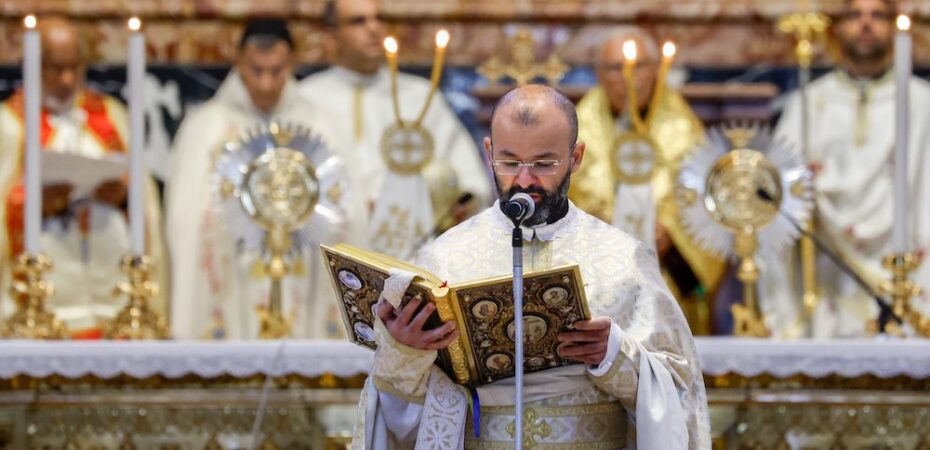Animators of Charisms in Worship and Life
The deacon petitions in the ordering of the priestly charism on behalf of the whole Church
Father Daniel Dozier Comments Off on Animators of Charisms in Worship and Life
One of the prominent features of the deacon in the Eucharistic liturgy in every Christian tradition — Eastern or Western — is his use of particular phrases, sometimes called petitions or commands. In the Byzantine tradition, these sound like: “It is time for the Lord to act! Reverend Father, give the blessing!”; “Let us pray to the Lord!”; “Wisdom! Be attentive!”; “Bless the proclaimer of the holy Gospel!”; “Bow your heads to the Lord!”; “Bless the holy Bread!”; “Let us love one another so that with one mind we may proclaim!”; “Approach with the fear of God and with faith!”
These phrases are indicators to either the bishop/presbyter or to the faithful of what they should be doing at that particular moment in the liturgy. In other words, these words and phrases indicate how they should celebrate or participate in the worship.
When directed toward the celebrating bishop or priest, the deacon is acting on behalf of the faithful, petitioning the celebrant to perform the prayers and actions needed for the celebration. A colleague commented that the assumption is that the celebrant may be too caught up in ecstatic prayer at the mystery unfolding before him and thus may forget what he is to do next! While this might be true in certain circumstances, there is a particular fittingness when, at certain moments, a deacon petitions as a means of participating in the ordering of the exercise of the priestly charism on behalf of the whole Church.
This is somewhat reminiscent of the Jewish view of the role of the angelic offices in relation to the cosmic and temple administration of the Torah, or Law. Strictly speaking, are the angelic powers necessary to God’s loving governance in his kingdom? No. But is there something fitting about God working through secondary causes to effect his will and providential ordering both in the world and in the liturgy of Israel and the Church? Yes, especially since God relishes the participation of his creatures in both his loving condescension (in Greek, catabasis) and his drawing up of humanity and the visible and invisible cosmos in an ascension (Greek, anabasis) of return back to himself. This circular movement is a double movement of grace and glory leading to union with the Father, effectuated in time by Christ and the Spirit.
The architecture of the Church itself is the spiritual topography of upward ascent toward God in the form of a “liturgical mountain,” whereby we ascend by grace into a transfiguring glory in Christ. The deacon and his petitions and commands in the public liturgy participate in the corporate ordering of this deifying ascent by helping others to participate and exercise their charisms proper to their role in the ordinances and services.
A charism is a spiritual gift from God intended for service to others and the Church. As St. Paul notes in Ephesians 4:12, spiritual charisms are given “to equip the holy ones for the work of ministry, for building up the body of Christ.” The deacon not only serves the bishop and presbyter in their exercise of charisms, but also the laity in the nave of the Church. He uses exhortations, petitions and commands since there is a particular way that the members of the royal priesthood of the baptized are to enter into and abide in the presence of the Lord. Israel did not simply walk up the mountain of God at Sinai! There were acts of repentance, and prayers, and sacrifices, not to mention warnings from the elders and servants of God on how to approach with reverence and a holy fear. This sense is echoed in the prayers of Israel centuries later: “Who may go up the mountain of the LORD? / Who can stand in his holy place? / ‘The clean of hand and pure of heart, / who has not given his soul to useless things, / what is vain’” (Ps 24:3-4).
The psalmist in this song of ascent to the Jerusalem temple refers to the temple complex as a mountain. The Levites who served as the chanters of the psalms would have been the ones exhorting priests and pilgrims ascending the mountain to prepare themselves to stand in the Lord’s holy place. These directions offered by the Levites — these Old Testament analogs to the New Testament deacons — show that such a role of exhortation, petitioning and commanding helps to facilitate the proper dispositions and practices of ascending worship, participation and the exercise of charisms.
This role of the deacon within the liturgy should also be mirrored in his pastoral labors, as well, where, in the “liturgy after the liturgy,” the clergy and the faithful need to continue their upward ascent to the Lord through living a spiritual life and in their service, especially in the corporal and spiritual works of mercy. Here the deacon is also to be an animator of the graces and charisms of all, encouraging and edifying them to offer creation, their lives, their families and their work back to the Lord for his glory.
FATHER DANIEL DOZIER is co-founder and chief learning officer for The Center for InMinistry Development and an associate professor of Scripture and Catholic leadership, www.inministrydevelopment.com.





